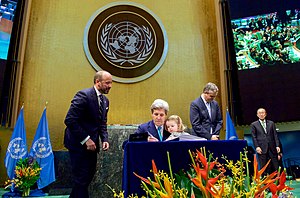Paris Agreement/ja: Difference between revisions
Created page with "透明性強化枠組みには、国の能力に応じて、報告の範囲、詳細レベル、または頻度を階層化することで柔軟性を組み込むことができる。一部の低開発国や小島嶼開発途上国については、国内技術レビューの要件が免除される場合がある。能力を評価する方法には、NDCレビューに必要な国の財政的および人的資源が含まれる。" |
Created page with "=== 訴訟 === {{main/ja|:en:Climate change litigation}} パリ協定は、気候変動訴訟の焦点となっている。この分野で最初の主要な訴訟の1つは、パリ協定以前にオランダ政府が2030年の排出削減目標を削減した後に提起された''オランダ国対ウルゲンダ財団''であった。2015年の政府に対する最初の判決で計画された削減を維持す..." |
||
| Line 216: | Line 216: | ||
透明性強化枠組みには、国の能力に応じて、報告の範囲、詳細レベル、または頻度を階層化することで柔軟性を組み込むことができる。一部の低開発国や小島嶼開発途上国については、国内技術レビューの要件が免除される場合がある。能力を評価する方法には、NDCレビューに必要な国の財政的および人的資源が含まれる。 | 透明性強化枠組みには、国の能力に応じて、報告の範囲、詳細レベル、または頻度を階層化することで柔軟性を組み込むことができる。一部の低開発国や小島嶼開発途上国については、国内技術レビューの要件が免除される場合がある。能力を評価する方法には、NDCレビューに必要な国の財政的および人的資源が含まれる。 | ||
=== 訴訟 === | |||
== | {{main/ja|:en:Climate change litigation}} | ||
{{main|Climate change litigation}} | パリ協定は、気候変動訴訟の焦点となっている。この分野で最初の主要な訴訟の1つは、パリ協定以前にオランダ政府が2030年の排出削減目標を削減した後に提起された''[[:en:State of the Netherlands v. Urgenda Foundation|オランダ国対ウルゲンダ財団]]''であった。2015年の政府に対する最初の判決で計画された削減を維持するよう求められた後、2019年には[[:en:Supreme Court of the Netherlands|オランダ最高裁判所]]による控訴審で判決が支持され、オランダ政府は排出目標を低下させることにより、オランダ法および[[:en:European Convention on Human Rights|欧州人権条約]]に基づく人権を擁護しなかったと判断された。パリ協定の2℃の温度目標は、判決の法的根拠の一部を提供した。目標がドイツ法に明記されている協定は、''[[:en:Neubauer et al. v. Germany|ノイバウアー他対ドイツ]]''における議論の一部も形成し、裁判所はドイツに気候目標の見直しを命じた。 | ||
<div lang="en" dir="ltr" class="mw-content-ltr"> | <div lang="en" dir="ltr" class="mw-content-ltr"> | ||
Revision as of 17:04, 15 July 2025
| Condition | UNFCCC締約国の55%が批准・加入し、世界の温室効果ガス排出量の55%を占めること |
|---|
パリ協定(パリ合意またはパリ気候協定とも呼ばれる)は、2016年に署名された気候変動に関する国際条約である。この条約は、気候変動の緩和、適応、および資金を対象としている。パリ協定は、パリ近郊のフランスで開催された2015年国連気候変動会議で196の締約国によって交渉された。2023年2月現在、国連気候変動枠組条約(UNFCCC)の195の加盟国が協定の締約国である。協定を批准していないUNFCCC加盟3カ国のうち、唯一の主要な排出国はイランである。2番目に大きな排出国である米国は、2020年に協定から脱退し、2021年に再加入し、2025年に再び脱退すると発表した。
パリ協定には、世界の地表温度の上昇を産業革命以前のレベルから2 °C (3.6 °F)をはるかに下回るように維持するという長期的な温度目標がある。この条約はまた、好ましくは増加の制限を1.5 °C (2.7 °F)のみにするべきであると述べている。これらの制限は、長年にわたって測定された地球の平均気温として定義されている。
気温の上昇が低いほど、気候変動の影響は小さいと予想される。この温度目標を達成するためには、温室効果ガス排出量をできるだけ早く、できるだけ多く削減する必要がある。21世紀半ばまでには実質ゼロに到達する必要がある。地球温暖化を1.5℃未満に抑えるためには、2030年までに排出量を約50%削減する必要がある。この数字は、各国の文書化された公約を考慮に入れている。パリ協定が署名された後も、世界の排出量は減少するどころか増加し続けている。2024年は記録上最も暑い年であり、世界の平均気温は1.5℃以上上昇した。
この条約は、各国が気候変動の影響に適応し、十分な資金を動員するのを助けることを目的としている。協定の下で、各国は自国の貢献を決定し、計画し、定期的に報告しなければならない。特定の排出目標を設定することを国に強制するメカニズムはないが、各目標は以前の目標を超えるべきである。1997年の京都議定書とは対照的に、先進国と途上国の区別は曖昧になり、後者も排出削減計画を提出しなければならない。
パリ協定は、2016年4月22日(アースデイ)にニューヨークの国連本部での式典で署名のために開放された。欧州連合が協定を批准した後、十分な数の国が世界の温室効果ガスの十分な量を占める協定を批准し、協定は2016年11月4日に発効した。
世界の指導者たちはこの協定を賞賛している。しかし、一部の環境保護主義者やアナリストは、厳格ではないと批判しており、その有効性については議論がある。パリ協定の下での公約は、設定された温度目標を達成するには不十分であるが、野心を高めるメカニズムが存在する。パリ協定は、2010年代後半に気候訴訟で成功裏に使用され、国や石油会社に気候変動対策を強化するよう強制している。
目的
協定の目的は、第2条に記載されているように、気候変動の危険性に対してより強力な対応をすることである。気候変動に関する国際連合枠組条約の実施を以下の方法で強化することを目指している。
(a) 世界の平均気温上昇を産業革命以前の水準から2℃をはるかに下回る水準に抑え、1.5℃に抑える努力を追求すること。これは気候変動のリスクと影響を大幅に軽減することを認識する。
(b) 食料生産を脅かさない方法で、気候変動の悪影響に適応する能力を高め、気候変動に対するレジリエンスと低温室効果ガス排出型開発を促進すること。
(c) 資金の流れを、低温室効果ガス排出と気候変動に強い開発への道筋と整合させること。
各国はさらに、「温室効果ガス排出量の世界的なピークをできるだけ早く」達成することを目指している。
進展

リードアップ
1992年の地球サミットで採択された国連気候変動枠組条約(UNFCCC)は、この分野における最初の国際条約の一つである。同条約は、締約国が気候変動に対処するため、締約国会議(COP)で定期的に会合を開くべきであると規定している。これは将来の気候協定の基礎を形成する。
1997年に採択された京都議定書は、2008年から2012年までの限定された国々の温室効果ガス削減を規制した。議定書は2012年のドーハ修正案によって2020年まで延長された。米国は、主にその法的拘束力がある性質のために、議定書を批准しないことを決定した。このことと、分配に関する対立が、その後の国際的な気候交渉の失敗につながった。2009年の交渉は京都の後継条約を生み出すことを意図していたが、交渉は決裂し、結果として生まれたコペンハーゲン合意は法的拘束力がなく、普遍的に採択されなかった。
この合意は、パリ協定のボトムアップアプローチの枠組みを築いた。UNFCCC事務局長クリスティアナ・フィゲレスのリーダーシップの下、コペンハーゲンの失敗後、交渉は勢いを盛り返した。2011年国連気候変動会議では、2020年以降の気候変動緩和措置を規定する法的文書を交渉するためにダーバン・プラットフォームが設立された。このプラットフォームは、IPCCの第5次評価報告書とUNFCCCの補助機関の作業から情報を得るというマンデートを持っていた。結果として得られる合意は2015年に採択されることになっていた。
交渉と採用

パリでの交渉は2週間にわたって行われ、最後の3夜間も継続された。その前年には様々な草案や提案が議論され、整理されてきた。ある評論家によると、フランスが成功の可能性を高めた2つの方法は、第一に約束草案(INDCs)が交渉開始前に完了していることを確実にすること、第二に会議の冒頭のみにリーダーを招待することであった。
交渉は、米国法務チームが土壇場で「shall」(しなければならない)ではなく「should」(すべきである)が承認されたことを認識し、先進国が法的に排出量削減を義務付けられることになるため、たった一語で失敗しそうになった。フランスはこれを「誤植」として変更することで問題を解決した。COP21(第21回締約国会議)の終わりに、2015年12月12日、パリ協定の最終文言は、UNFCCCに参加する195の加盟国と欧州連合のコンセンサスによって採択された。ニカラグアは、協定の弱さを非難して採択に反対したかったが、機会を与えられなかったと表明した。協定において、加盟国は「できるだけ早く」炭素排出量を削減し、地球温暖化を「2℃をはるかに下回る」(3.6°F)に抑えるために最善を尽くすことを約束した。
署名と発効
パリ協定は、2016年4月22日から2017年4月21日まで、ニューヨークの国連本部で、UNFCCC(条約)の締約国である国家および地域経済統合機関による署名のために開放された。協定への署名は批准への第一歩であるが、署名せずに協定に加入することも可能である。これにより、締約国は条約の目標に反する行為を行わない義務を負う。2016年4月1日、世界の排出量のほぼ40%を占める米国と中国は、パリ気候協定に署名することを確認した。協定は、署名のために開放された初日に175の締約国(174の国家と欧州連合)によって署名された。2021年3月現在、194の国家と欧州連合が協定に署名している。

本協定は、世界の温室効果ガス排出量の少なくとも55%(2015年に作成されたリストによる)を排出する55カ国が批准またはその他の方法で条約に参加した場合に発効する(したがって完全に効力を持つ)。条約に参加する代替方法は、受諾、承認、または加入である。最初の2つは通常、国家元首が国を条約に拘束する必要がない場合に使用され、後者は通常、国が既に発効している条約に参加する場合に発生する。欧州連合による批准後、本協定は2016年11月4日に発効するために十分な締約国を獲得した。
[:en:European Union|EU]]とその加盟国は両者とも、パリ協定の批准に対して個別に責任を負う。EUとその28の加盟国が同時に批准することで、厳密に他方に属する義務を負わないようにすることを強く望む声が報告されており、EU全体の削減目標に対する各加盟国の分担をめぐる意見の相違や、英国のEU離脱投票がパリ協定を遅らせるのではないかという懸念がオブザーバーからあった。しかし、EUは2016年10月5日に、7つのEU加盟国とともに批准書を寄託した。
当事者

批准または加入した国
EUと194の国々が協定を批准または加入しており、これは温室効果ガス排出量の98%以上を占める。批准していない国は、中東の温室効果ガス排出国の一部であり、世界全体の2%を占めるイランが最大である。リビアとイエメンも協定を批准していない。エリトリアは、2023年2月7日に協定を批准した最新の国である。
第28条により、締約国は寄託者に脱退通知を送付した後、協定から脱退することができる。通知は、協定がその国で発効してから3年以前に行うことはできない。脱退は、寄託者に通知された後1年で発効する。
アメリカ合衆国の脱退、再加入、再脱退
2017年8月4日、トランプ政権は、米国が、中国に次ぐ世界第2位の温室効果ガス排出国として、パリ協定から脱退する意向であることを国連に正式に通知した。米国政府は、国連事務総長に通知書を寄託し、1年後の2020年11月4日に正式に脱退した。
ジョー・バイデン大統領は、就任初日である2021年1月20日に、米国をパリ協定に再加入させるための大統領令に署名した。第21条3項で定められた30日間の期間を経て、米国は協定に再加入した。米国気候変動特使ジョン・ケリーはオンラインイベントに参加し、米国はパリプロセスの正当性を「取り戻す」と述べた。国連事務総長アントニオ・グテーレスは、米国の復帰を「全体を弱めていた失われた環」を回復するものとして歓迎した。
2025年1月20日、ドナルド・トランプ大統領は、再び米国を協定から脱退させる大統領令に署名した。
内容
構成
パリ協定は、16の序文段落と29の条項からなる短い協定である。これは、手続きに関する条項(例えば、発効基準をカバーする)と、運用に関する条項(例えば、緩和、適応、資金をカバーする)を含んでいる。これは拘束力のある協定であるが、その条項の多くは義務を意味するものではなく、国際協力を促進するためのものである。ほとんどの温室効果ガス排出量をカバーしているが、国際航空および海運には適用されない。これらはそれぞれ国際民間航空機関と国際海事機関の責任下にある。
パリ協定は、その中核となる約束と検討メカニズムが、目標をトップダウンで課すのではなく、各国が独自の自国が決定する貢献(NDCs)を設定することを可能にするため、ボトムアップ構造を持つと記述されている。法的拘束力を持つコミットメント目標を設定する前身の京都議定書とは異なり、パリ協定はコンセンサス形成を重視し、自発的で国が決定する目標を可能にしている。したがって、具体的な気候目標は、法的に義務付けられているというよりも、政治的に奨励されている。これらの目標の報告と検討を規定するプロセスのみが国際法の下で義務付けられている。この構造は、特に米国にとって注目に値する。なぜなら、法的な緩和目標や資金目標がないため、この協定は「条約ではなく行政協定」とみなされているからである。1992年のUNFCCC条約は米国上院の同意を得ているため、この新しい協定はさらなる立法を必要としない。
パリ協定と京都議定書のもう一つの重要な違いは、その範囲である。京都議定書は、附属書I国、つまり気候変動に対する歴史的責任を持つ富裕国と非附属書I国を区別していたが、パリ協定では、すべての締約国が排出削減計画を提出することを求められるため、この区分は曖昧になっている。パリ協定は、共通だが差異ある責任とそれぞれの能力の原則(異なる国家が気候変動対策に対して異なる能力と義務を持つことを認識すること)を依然として強調しているが、先進国と途上国の間の具体的な区分は設けていない。
国が決定する貢献

各国は、条約の目的を達成するために、どのような貢献をすべきかを自ら決定する。そのため、これらの計画は「自国が決定する貢献」(NDCs)と呼ばれる。第3条は、NDCsが「本協定の目的を達成するための」「野心的な努力」であり、「時とともに進歩を示す」ものであることを要求している。貢献は5年ごとに設定され、UNFCCC事務局によって登録されることになっている。それぞれのさらなる目標は、前のものよりも野心的であるべきであり、「進歩」の原則として知られている。各国は協力して自国が決定する貢献をまとめることができる。2015年気候変動会議中に約束された約束草案は、国がパリ協定を批准する際にNDCに変換される(更新を提出しない限り)。
パリ協定はNDCsの正確な性質を規定していない。最低限、緩和規定を含むべきであるが、適応、資金、技術移転、能力構築、透明性に関する誓約を含むこともできる。NDCsにおける誓約の一部は無条件であるが、資金や技術支援の入手、他の締約国の野心、まだ設定されていないパリ協定の規則の詳細など、外部要因に条件付けられているものもある。ほとんどのNDCには条件付きの要素が含まれている。
NDCs自体には拘束力はないが、それらを取り巻く手続きには拘束力がある。これらの手続きには、連続するNDCを作成、伝達、維持する義務、5年ごとに新しいNDCを設定する義務、および実施に関する情報を提供する義務が含まれる。国に特定の期日までにNDC目標を設定する、または目標を達成することを強制するメカニズムはない。非難と公表システム、あるいは元国連気候変動担当事務次長補ヤノシュ・パストルが述べたように、「非難と奨励」計画のみが存在する。
グローバルストックテイク
パリ協定の下、各国は5年ごとに目標を引き上げなければならない。これを促進するため、協定はグローバル・ストックテイクを設立し、進捗状況を評価する。最初の評価は2023年に行われた。その結果は、締約国の新しい自国が決定する貢献のインプットとして使用されることになっている。2018年のタラノア対話は、グローバル・ストックテイクの例と見なされた。1年間の議論の後、報告書が発行され、行動が求められたが、その後各国は目標を引き上げなかった。
ストックテイクは、排出削減における野心の「ラチェットアップ」を生み出すパリ協定の努力の一環として機能する。アナリストが2014年にNDCsが気温上昇を2℃未満に制限しないことに同意したため、グローバル・ストックテイクは締約国を再招集し、国の「可能な限り最高の野心」を継続的に反映するように新しいNDCsがどのように進化すべきかを評価する。NDCsの野心を高めることがグローバル・ストックテイクの主要な目的であるが、緩和以外の努力も評価する。5年ごとのレビューでは、適応、気候資金の規定、技術開発と移転も評価される。
2023年11月30日、国連気候変動会議(COP28)がドバイで開幕し、気候変動対策に向けた努力の強化が改めて呼びかけられた。
緩和策と炭素市場
第6条は、パリ協定の主要な規定の一部を含むものとして注目されている。大まかに言えば、締約国が自国の炭素排出量削減を達成するためにとることができる協力的なアプローチの概要を述べている。そうすることで、パリ協定をグローバルな炭素市場の枠組みとして確立するのに役立っている。第6条は、協定の唯一の重要な未解決部分である。2019年の交渉では結果が出なかった。この問題はグラスゴーでの2021年COP26で解決された。「対応調整」というメカニズムが、排出オフセットの二重計上を避けるために確立された。
炭素取引システムとITMOの連携
第6条2項および6条3項は、国際的に移転された緩和成果(ITMOs)を規定する枠組みを確立している。本協定は、炭素会計および取引システムにおいて、自国外での排出量削減を自国のNDCに充当する締約国の権利を認めている。この規定は、炭素排出量取引システムの「連携」を必要とする。測定された排出量削減は「二重計上」を避ける必要があるため、移転された緩和成果は、一方の締約国にとっては排出単位の増加として、他方の締約国にとっては排出単位の減少として記録されなければならない。これは「対応調整」と呼ばれる。NDCおよび国内炭素取引スキームは異質であるため、ITMOはUNFCCCの後援の下でグローバルな連携のための形式を提供する。したがって、この規定はまた、各国に排出量管理システムを採用するよう圧力をかける。つまり、国がNDCを達成するために費用対効果の高い協力的なアプローチを使用したい場合、自国の経済のために炭素単位を監視する必要がある。
これまでのところ、ITMOを購入したい唯一の国であるスイスは、ペルー、ガーナ、セネガル、グルジア、ドミニカ、バヌアツ、タイ、ウクライナとITMO取引に関する契約を締結している。
| 国 | 署名日 | 出典 |
|---|---|---|
| ペルー | 2020年10月20日 | |
| ガーナ | 2020年11月23日 | |
| セネガル | 2021年7月6日 | |
| グルジア | 2021年10月18日 | |
| ドミニカ | 2021年11月11日 | |
| バヌアツ | 2021年11月11日 | |
| タイ | 2022年6月24日 | |
| ウクライナ | 2022年7月4日 |
持続可能な開発メカニズム
第6条4項から6条7項は、「温室効果ガスの緩和に貢献し、持続可能な開発を支援する」メカニズムを確立している。現時点ではこのメカニズムに公式名称はないが、持続可能な開発メカニズム(SDM)と呼ばれている。SDMは、クリーン開発メカニズムの後継と見なされている。クリーン開発メカニズムは、京都議定書の下で締約国が協力して排出量削減を追求できるメカニズムであった。
SDMは、世界のGHG排出量削減に貢献し、持続可能な開発を支援するという二重の目標を持つ、クリーン開発メカニズムと大きく類似しているとされている。SDMを規定する構造とプロセスはまだ決定されていないが、クリーン開発メカニズムとの特定の類似点と相違点が明らかになっている。主要な相違点は、SDMが附属書I国だけでなくすべての締約国に利用可能になることで、その範囲がはるかに広くなることである。
京都議定書のクリーン開発メカニズムは、ほとんどの場合、意味のある排出量削減や持続可能な開発上の利益を生み出すことに失敗したこと、そしてその複雑さについて批判された。SDMも困難に直面する可能性がある。
気候変動適応規定
気候変動適応は、これまでの気候条約よりもパリ交渉でより重視された。集団的で長期的な適応目標が協定に含まれており、各国は適応行動について報告しなければならず、緩和策と並行する要素となっている。適応目標は、適応能力の向上、レジリエンスの強化、脆弱性の制限に焦点を当てている。
実施
パリ協定は、国内政策を通じて実施される。これには、世界経済のエネルギー強度を低下させるためのエネルギー効率の改善が伴う。実施にはまた、化石燃料燃焼の削減と持続可能なエネルギーの割合の急速な増加も必要となる。排出量は電力部門では急速に削減されているが、建物、運輸、暖房部門ではそうではない。一部の産業は脱炭素化が困難であり、それらの産業では正味ゼロ排出量を達成するために二酸化炭素除去が必要となる場合がある。2022年に発表された報告書で、IPCCはパリ協定の目標達成のために、イノベーションと技術的変化を消費および生産行動の変化と組み合わせる必要性を推進している。
地球温暖化を1.5℃未満に抑えるためには、2030年までに排出量を約50%削減する必要がある。これは各国の自国が決定する貢献の合計である。今世紀半ばまでに、CO2排出量はゼロにする必要があり、総温室効果ガスは今世紀半ば直後に正味ゼロにする必要がある。
協定の実施には障壁がある。一部の国は、脱炭素化への投資に必要な資金を誘致するのに苦労している。気候変動資金は断片化されており、投資をさらに複雑にしている。もう一つの問題は、政策を実施するための政府や他の機関における能力の不足である。クリーン技術と知識は、しばしばそれを必要とする国や場所に伝えられない。2020年12月、COP21の元議長であるローラン・ファビウスは、パリ協定の実施が環境に関するグローバル協定の採択によって強化され得ると主張した。後者は、国家、個人、企業の環境上の権利と義務を定義するものである。
特に関心のあるトピック
有効性

パリ協定がその気候目標を達成する上での有効性は議論の的となっており、ほとんどの専門家は、世界の気温上昇を1.5℃未満に抑えるというより野心的な目標には不十分であると述べている。パリ協定の正確な規定の多くはまだ整理されておらず、有効性を判断するには時期尚早かもしれない。2020年の国連環境計画(UNEP)によると、パリ協定の現在の気候公約では、21世紀末までに世界の平均気温は3℃以上上昇する可能性が高い。新しいネットゼロ公約は自国が決定する貢献に含まれておらず、さらに0.5℃気温を下げることができるかもしれない。
各国の初期の公約が不十分であるため、目標を達成するためには、将来より迅速でより費用のかかる緩和が必要となるだろう。さらに、各国がNDCsで行った公約とそれらの公約の実施との間にはギャップがある。既存の公約を実施することで、排出量削減における最低コストと実際の削減量との間の排出ギャップの3分の1が解消されるだろう。ネイチャー誌に掲載された2つの研究では、2017年現在、主要な工業国はいずれも約束した政策を実施しておらず、約束した排出削減目標も達成していなかったことが判明し、たとえ達成していたとしても、すべての加盟国の約束の合計(2016年現在)では世界の気温上昇を「2℃をはるかに下回る」水準に抑えることはできないだろうと結論付けた。
2021年、確率論的モデルを用いた研究は、パリ協定の2℃という上限目標を達成するためには、排出削減率をNDCsを80%上回る水準に引き上げる必要があり、そのような引き上げがなければ主要排出国がNDCを達成する確率は非常に低いと結論付けた。現在の傾向では、NDCが達成され、2030年以降もすべての署名国によって継続された場合、温暖化を2℃未満に抑える確率は5〜26%であると推定された。
2020年現在、パリ協定は能力構築と適応のトピックに重点を置いているにもかかわらず、それらの有効性に関する科学文献はほとんどない。利用可能な文献は、損失と損害、そして適応に関する結論がほとんど混在している。
ストックテイク報告書によると、協定は大きな効果を発揮している。2010年には2100年までに予想される気温上昇は3.7〜4.8℃であったが、COP27では2.4〜2.6℃となり、すべての国が長期的な公約を果たすならば1.7〜2.1℃になる。それにもかかわらず、世界は協定の目標である気温上昇を1.5℃に抑えることから依然として大きくかけ離れている。これを達成するためには、排出量は2025年までにピークに達しなければならない。最近の研究では、2024年に平均気温が1.5℃を上回る最初の単一の暦年となったことから、地球はすでに平均温暖化が1.5℃に達する20年間の期間に入った可能性が高いことが示されている。さらに、世界の平均気温は2024年にすでに1.5℃の水準を超えた可能性があると示唆されている。
パリ協定は、その後のIPCC報告書の焦点にも影響を与えたようだ。パリ協定が合意される前は、IPCCの評価報告書は、2℃以上と2℃未満の気温にほぼ均等に焦点を当てていた。しかし、パリ協定が締結された後の第6次評価報告書では、気温に関する言及の20%弱しか2℃以上ではなく、ほぼ50%が1.5℃のみに焦点を当てている。
要件の達成


2021年9月、クライメート・アクション・トラッカーは、現在の政策では、世界の排出量は2030年の目標レベルを2倍上回ると推定した。ギャップは20~23ギガトンCO2eである。イラン、ロシア、サウジアラビア、シンガポール、タイなどの国々は、協定の要件を満たすために十分な努力をしていないと批判されており、現在の政策がより広く実施されれば、地球の温暖化を4℃にすることになるだろう。世界の国々の中で、ガンビアの排出量のみがパリ協定で要求されるレベルにある。モデルは、必要な措置が2021年秋までに実施されない場合、世界の平均気温は2.9℃上昇すると予測した。パリ協定の公約が実施されれば、平均気温は2.4℃上昇し、すべてのゼロエミッション目標が達成されれば、平均気温は2.0℃上昇するだろう。
「生産ギャップ2021」報告書は、世界各国政府が2030年には1.5℃制限よりも110%多くの化石燃料(石炭240%増、石油57%増、ガス71%増を含む)を生産する計画であることを述べている。
2023年9月、協定の実施に関する最初のグローバル・ストックテイク報告書が発表された。報告書によると、予想に反して、協定は大きな効果を発揮している。2010年には2100年までに予想される気温上昇は3.7〜4.8℃であったが、COP27では2.4〜2.6℃となり、すべての国が長期的な公約を果たすならば1.7〜2.1℃になる。しかし、世界は温暖化を1.5℃に抑えることから依然として大きくかけ離れている。この目標を達成するためには、世界の排出量は2025年までにピークに達しなければならないが、一部の国では排出量がピークに達しているものの、世界の排出量はまだピークに達していない。
資金の確保

先進国は、2020年までに年間1,000億ドルの気候資金を動員するというコミットメントを再確認し、2025年までこのレベルで資金動員を継続することに合意した。この資金は、開発途上国における緩和と適応を支援するためのものである。これには、UNFCCCの一部である緑の気候基金への資金も含まれるが、その他様々な公的および私的な誓約も含まれる。パリ協定は、2025年までに少なくとも年間1,000億ドルの新しいコミットメントが合意されなければならないと述べている。
緩和と適応の両方とも気候資金の増加を必要とするが、適応は通常、より低いレベルの支援しか受けておらず、民間部門からの行動も少ない。OECDの報告書によると、2013年から2014年には、世界の気候資金の16%が気候適応に充てられ、緩和には77%が充てられた。パリ協定は、適応と緩和の間の気候資金のバランスを求め、特に後発開発途上国や小島嶼開発途上国を含む、気候変動の影響に最も脆弱な締約国に対する適応支援の増加を求めた。また、協定は、適応策が公共部門からの投資が少ないため、公的助成金の重要性を締約国に喚起している。
2015年、20の多国間開発銀行(MDBs)と国際開発金融クラブのメンバーは、投資における広範な気候変動対策を維持するための5つの原則を導入した。すなわち、気候戦略へのコミットメント、気候リスクの管理、気候スマート目標の推進、気候パフォーマンスの改善、および自らの行動の説明責任である。2020年1月現在、これらの原則を遵守するメンバーの数は44に増加した。
パリにおける適応資金への注目度が高まった具体的な成果としては、G7諸国による気候リスク保険のために4億2,000万米ドルを提供するという発表や、気候リスク早期警戒システム(CREWS)イニシアティブの立ち上げなどがある。緑の気候基金を含む多国間気候基金への最大のドナーは、米国、英国、日本、ドイツ、フランス、スウェーデンである。
損失と損害
気候変動のあらゆる影響に適応することは不可能である。最適な適応の場合でも、深刻な損害が発生する可能性がある。パリ協定は、この種の損失と損害を認識している。損失と損害は、異常気象イベント、または低地島嶼国にとっての海面上昇による土地の喪失などの緩慢な進行イベントから生じる可能性がある。以前の気候協定は、損失と損害を適応のサブセットとして分類していた。
パリ協定で損失と損害を別の問題として取り上げるよう推進したのは、経済と生計が気候変動の悪影響に最も脆弱な小島嶼国同盟と後発開発途上国であった。COP19で2年前に設立され、2016年に期限切れとなる予定だったワルシャワ・メカニズムは、損失と損害を適応のサブセットとして分類しており、これは多くの国にとって不評であった。これはパリ協定の別の柱として認識されている。米国はこれに反対し、問題を適応とは別のものとして分類することが、さらなる気候資金の規定を生み出すことを懸念していた可能性がある。最終的に、協定は「損失と損害の回避、最小化、対処」を求めているが、責任の根拠として使用できないことを明記している。協定は、損失の分類、対処、責任分担に関する問題を解決しようとする機関であるワルシャワ・メカニズムを採用している。
透明性
締約国は、NDC達成に向けた進捗状況を評価し、野心を強化する方法を決定するために、技術専門家によるレビューによってその進捗状況を追跡することが法的に義務付けられている。パリ協定第13条は、調和された監視、報告、検証(MRV)要件を確立する「行動と支援のための強化された透明性枠組み」を明確にしている。先進国と開発途上国の両方は、緩和努力について2年ごとに報告しなければならず、すべての締約国は技術的およびピアレビューの対象となる。
強化された透明性枠組みは普遍的であるが、この枠組みは、先進国と開発途上国の能力を区別するための「組み込みの柔軟性」を提供するものとされている。パリ協定には、能力構築のための強化された枠組みの規定があり、各国の様々な状況を認識し、各国の報告能力を考慮して各国の技術専門家レビューを行うこととしている。協定の締約国は、2024年までに、その後2年ごとに、最初の隔年透明性報告書(BTR)と温室効果ガス目録の数値をUNFCCCに提出する。先進国は、2022年に最初のBTRを提出し、それ以降毎年目録を提出する。また、協定は、開発途上国がコンプライアンスに必要な機関とプロセスを構築するのを支援するための、透明性のための能力構築イニシアティブを開発している。
透明性強化枠組みには、国の能力に応じて、報告の範囲、詳細レベル、または頻度を階層化することで柔軟性を組み込むことができる。一部の低開発国や小島嶼開発途上国については、国内技術レビューの要件が免除される場合がある。能力を評価する方法には、NDCレビューに必要な国の財政的および人的資源が含まれる。
訴訟
パリ協定は、気候変動訴訟の焦点となっている。この分野で最初の主要な訴訟の1つは、パリ協定以前にオランダ政府が2030年の排出削減目標を削減した後に提起されたオランダ国対ウルゲンダ財団であった。2015年の政府に対する最初の判決で計画された削減を維持するよう求められた後、2019年にはオランダ最高裁判所による控訴審で判決が支持され、オランダ政府は排出目標を低下させることにより、オランダ法および欧州人権条約に基づく人権を擁護しなかったと判断された。パリ協定の2℃の温度目標は、判決の法的根拠の一部を提供した。目標がドイツ法に明記されている協定は、ノイバウアー他対ドイツにおける議論の一部も形成し、裁判所はドイツに気候目標の見直しを命じた。
In May 2021, the district court of The Hague ruled against oil company Royal Dutch Shell in Milieudefensie et al v Royal Dutch Shell. The court ruled that it must cut its global emissions by 45% from 2019 levels by 2030, as it was in violation of human rights. This lawsuit was considered the first major application of the Paris Agreement towards a corporation.
Human rights
On 4 July 2022, the Supreme Federal Court of Brazil recognized the Paris agreement as a "human rights treaty". According to the ruling of the court in Brazil it should "supersede national law". In the same month the United Nations Human Rights Council in a resolution "(A/HRC/50/L.10/Rev.1) on Human rights and climate change, adopted without a vote" called to ratify and implement the agreement and emphasized the link between stopping climate change and the right to food.
The Office of the United Nations High Commissioner for Human Rights officially recognized that "Climate change threatens the effective enjoyment of a range of human rights including those to life, water and sanitation, food, health, housing, self-determination, culture and development."
Reception
The agreement was lauded by French president François Hollande, UN secretary-general Ban Ki-moon and Christiana Figueres, Executive Secretary of the UNFCCC. The president of Brazil, Dilma Rousseff, called the agreement "balanced and long-lasting", and India's prime minister Narendra Modi commended the agreement's climate justice. When the agreement achieved the required signatures in October 2016, US president Barack Obama said that "Even if we meet every target, we will only get to part of where we need to go." He also stated "this agreement will help delay or avoid some of the worst consequences of climate change [and] will help other nations ratchet down their emissions over time."
Some environmentalists and analysts reacted cautiously, acknowledging the "spirit of Paris" in bringing together countries, but expressing less optimism about the pace of climate mitigation and how much the agreement could do for poorer countries. James Hansen, a former NASA scientist and leading climate change expert, voiced anger that most of the agreement consists of "promises" or aims and not firm commitments and called the Paris talks a fraud with "no action, just promises". Criticism of the agreement from those arguing against climate action has been diffuse, which may be due to the weakness of the agreement. This type of criticism typically focuses on national sovereignty and ineffectiveness of international action.
関連項目
参考資料
- Jepsen, Henrik; et al. (2021). Negotiating the Paris Agreement: The Insider Stories. Cambridge University Press. ISBN 978-1-108-88624-6.
- Teske, Sven; et al. (2019). Achieving the Paris Climate Agreement Goals. Springer. ISBN 978-3-030-05842-5.
外部リンク
| この記事は、クリエイティブ・コモンズ・表示・継承ライセンス3.0のもとで公表されたウィキペディアの項目Paris Agreement(24 June 2025, at 07:27編集記事参照)を翻訳して二次利用しています。 |
- Pages using Infobox treaty with unknown parameters
- Paris Agreement
- 2015 in Paris
- 2015 in the environment
- December 2015 in France
- Environmental treaties
- Human rights instruments
- International law
- Lists of treaties
- November 2015 in France
- Science diplomacy
- Treaties concluded in 2015
- Treaties entered into by the European Union
- Treaties entered into force in 2016
- Treaties extended to Hong Kong
- Treaties extended to Macau
- Treaties signed in Paris
- United Nations Framework Convention on Climate Change
- United Nations treaties